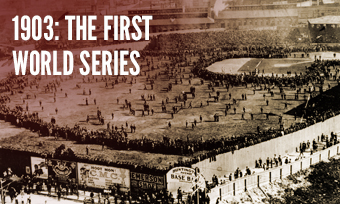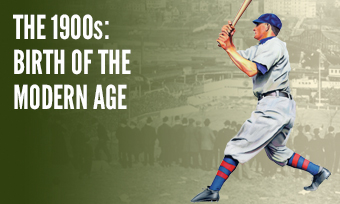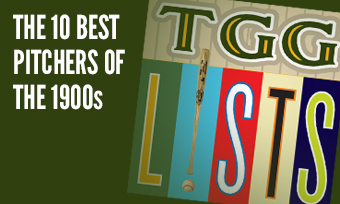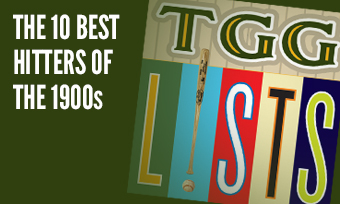The Yearly Reader
Leaders and Honors, 1903
Our list of baseball’s top 10 hitters and pitchers in both the American League and National League for the 1903 baseball season, as well as the awards and honors given to the game’s top achievers of the year.
The National League’s Top 10 Hitters, 1903
Bold type in brick red indicates league leader.
1. Honus Wagner, Pittsburgh
Key Numbers: .355 average, 19 triples, 5 home runs, 101 RBIs, 46 stolen bases.
Wagner returned to the top podium in the NL batting race for the first time in three years—and the first of six times over the next seven seasons.
2. Jimmy Sheckard, Brooklyn
Key Numbers: .332 average, 99 runs, 9 home runs, 75 RBIs, 75 walks, 67 stolen bases.
Sheckard returned to prominence in Brooklyn following a disappointing 1902 season in which he fled to the AL’s Baltimore Orioles—and then fled from them after four games when he realized what a mistake he had made.
3. Frank Chance, Chicago
Key Numbers: .327 average, 83 runs, 81 RBIs, 78 walks, 67 stolen bases, .439 on-base percentage.
The soon-to-be Cubs manager evolved from part-time catcher to everyday first baseman, allowing him the opportunity to show off his everyday penchant for reaching base.
4. Mike Donlin, Cincinnati
Key Numbers: .351 average, 110 runs, 18 triples, 7 home runs, 67 RBIs.
A year after spending five months in jail for assaulting an actress and her boyfriend/escort, Donlin got in a rare full season—and a good one, too.
5. Fred Clarke, Pittsburgh
Key Numbers: .351 average, 88 runs, 32 doubles, 15 triples, 5 home runs, 70 RBIs.
The Pirates’ manager-outfielder continued to lead by example, hitting for his second highest average following a .390 mark during his 1897 rookie managerial effort at Louisville.
6. Sam Mertes, New York
Key Numbers: .280 average, 100 runs, 32 doubles, 14 triples, 7 home runs, 104 RBIs, 45 stolen bases.
One of the rare cases of an AL player being stolen away from a NL team (though the Giants had become awfully good at that), Mertes cooled off after a blazing start but still reigned as one of the NL’s top sluggers of the moment.
7. Roger Bresnahan, New York
Key Numbers: 113 games, .350 average, 87 runs, 30 doubles, 61 walks.
Playing most of the year in the outfield before finding his calling as an inventive catcher, Bresnahan sparkled with a career-high batting average.
8. Ginger Beaumont, Pittsburgh
Key Numbers: .341 average, 137 runs, 209 hits, 7 home runs, 68 RBIs.
The speedy redhead paced the NL in runs for the only time in his career, while notching his lone 200-hit season.
9. Cy Seymour, Cincinnati
Key Numbers: .342 average, 85 runs, 191 hits, 15 triples, 7 home runs, 72 RBIs.
Seymour returned to the NL as a dangerous hitter after leaving it as a workhorse pitcher in 1900.
10. Jake Beckley, Cincinnati
Key Numbers: .327 average, 29 doubles, 10 triples, 81 RBIs.
Like fine wine, the 36-year-old Beckley continued to show how he could do it better than most others in the majors.
The American League’s Top 10 Hitters, 1903
1. Nap Lajoie, Cleveland
Key Numbers: 125 games, .344 average, 90 runs, 167 hits, 41 doubles, 7 home runs, 93 RBIs.
Lajoie was able to fully concentrate on baseball a year after the bitter tug-of-war between the leagues got him sidelined by the courts.
2. Sam Crawford, Detroit
Key Numbers: .335 average, 23 doubles, 25 triples, 89 RBIs.
After being among the last of the highly disputed acquisitions between the AL and NL, Crawford came, saw and conquered the junior circuit.
3. Bill Bradley, Cleveland
Key Numbers: .313 average, 101 runs, 36 doubles, 22 triples.
A solid year for Bradley highlighted with single-game accomplishments; he became the first player in franchise history to hit for the cycle, while becoming the first American Leaguer to nail three triples in one game.
4. Buck Freeman, Boston
Key Numbers: 141 games, .287 average, 39 doubles, 20 triples, 13 home runs, 104 RBIs.
The AL’s premier bruiser by the numbers, Freeman led the AL for the second straight year in both extra-base hits and RBIs while leading it in home runs for the only time in his career.
5. Patsy Dougherty, Boston
Key Numbers: .331 average, 107 runs, 195 hits, 35 stolen bases.
Dougherty enjoyed the salad days of his very short—yet popular—tenure at Boston.
6. Jimmy Collins, Boston
Key Numbers: .296 average, 33 doubles, 17 triples, 5 home runs, 72 RBIs.
Despite not hitting .300 for the first time in three years, the third baseman-manager remained a tough out while leading the Americans (Red Sox) to their first world title.
7. Freddy Parent, Boston
Key Numbers: .304 average, 31 doubles, 17 triples, 4 home runs, 80 RBIs.
Known more for his abilities at shortstop, Parent had one of his stronger years at the plate.
8. Harry Davis, Philadelphia
Key Numbers: 106 games, .298 average, 6 home runs, 55 RBIs.
A midseason injury kept Davis from ranking higher on the list as he warmed up for his upcoming reign as the AL’s premier bopper.
9. Socks Seybold, Philadelphia
Key Numbers: .299 average, 45 doubles, 8 home runs, 84 RBIs.
The veteran outfielder kept the top home run spot warm for Davis by leading the A’s with eight—while leading the AL with 45 doubles.
10. Charlie Hickman, Cleveland
Key Numbers: .295 average, 12 home runs, 97 RBIs.
In one of the few seasons he’d spend with just one team, Hickman set a career high in home runs.
The National League’s Top 10 Pitchers, 1903
1. Joe McGinnity, New York
Key Numbers: 2.43 ERA, 31 wins, 20 losses, 55 games, 48 starts, 44 complete games, 434 innings.
Firmly established in New York under manager John McGraw, McGinnity was let loose and racked up a NL modern era-record 434 innings along with his first of two straight 30-win campaigns.
2. Sam Leever, Pittsburgh
Key Numbers: 2.06 ERA, 25 wins, 7 losses, .781 win percentage, 284.1 innings.
Though Deacon Phillippe would be remembered in this season for his workhorse performance at the World Series, Leever was his exhaustive equal during the regular season—with slightly better efficiency.
3. Deacon Phillippe, Pittsburgh
Key Numbers: 2.43 ERA, 25 wins, 9 losses, 289.1 innings.
Phillippe’s 25 wins would represent a personal best and cap a run of five straight years with at least 20.
4. Jack Taylor, Chicago
Key Numbers: 2.45 ERA, 21 wins, 14 losses, 312.1 innings.
A slight dropdown for Taylor from his stellar 1902 effort—but the Cubs still got rid of him after the season because of his attraction to being bribed. Not that Chicago risked talent loss; in trading Taylor to the Cardinals, the Cubs got Three Finger Brown in return.
5. Christy Mathewson, New York
Key Numbers: 2.26 ERA, 30 wins, 13 losses, 45 games, 42 starts, 366.1 innings, 267 strikeouts.
The Giants’ saint to the sinner that was the feisty Joe McGinnity (above), the straitlaced Mathewson began his run of three straight 30-win efforts—and his strikeout total was the most by a National Leaguer until Sandy Koufax came along.
6. Noodles Hahn, Cincinnati
Key Numbers: 2.52 ERA, 22 wins, 12 losses, 296 innings.
The Reds’ workhorse ace completed every one of his 34 starts but failed to pitch over 300 innings for the first time in his career.
7. Jake Weimer, Chicago
Key Numbers: 2.30 ERA, 20 wins, 8 losses, 282 innings.
The rookie 20-game-winner felt close to home in Chicago; after all, he was only 250 miles from his Iowa hometown.
8. Tully Sparks, Philadelphia
Key Numbers: 2.72 ERA, 11 wins, 15 losses.
After bouncing around here and there over the past six seasons with virtually no success, Sparks finally found his rhythm with the Phillies by becoming a master of mixing up the velocity of his pitches.
9. Oscar Jones, Brooklyn
Key Numbers: 2.94 ERA, 19 wins, 14 losses, 324.1 innings.
Nicknamed Flip-Flap for reasons we’re yet to uncover, Jones set a career mark for wins in his first (and arguably best) of a mere three years he’d spend in the majors.
10. Vic Willis, Boston
Key Numbers: 2.98 ERA, 12 wins, 18 losses, 278 innings.
A rare year in the career of Willis when he didn’t win and/or lose 20 games; still, his 12-18 mark failed to dignify a quality ERA.
The American League’s Top 10 Pitchers, 1903
1. Cy Young, Boston
Key Numbers: 2.08 ERA, 28 wins, 9 losses, .757 win percentage, 341.2 innings, 37 walks.
Young failed to reach 30 wins for the first time since joining the AL, but for all it was worth, he certainly could hit (a career-high .321 in 137 at-bats).
2. Bill Dinneen, Boston
Key Numbers: 2.26 ERA, 21 wins, 13 losses, 299 innings.
The Americans’ World Series hero (two shutouts against Pittsburgh) continued to flank Young as a worthy #2 during the regular season at Boston.
3. Earl Moore, Cleveland
Key Numbers: 1.74 ERA, 20 wins, 8 losses.
In between a rotten start and final month curtailed by injury, the sidewinding Moore put together a sterling career-year campaign.
4. Addie Joss, Cleveland
Key Numbers: 2.19 ERA, 18 wins, 13 losses, 283.2 innings.
There would be no sophomore jinx for Joss, who followed up a solid rookie season with a better second one; from here, it would only get better.
5. Rube Waddell, Philadelphia
Key Numbers: 2.44 ERA, 21 wins, 16 losses, 324 innings.
For the second straight season, Waddell managed to rack up 20+ wins for the A’s despite not being around from start to finish; in this case, he left in mid-August to chase a stage career.
6. Eddie Plank, Philadelphia
Key Numbers: 2.38 ERA, 23 wins, 16 losses, 43 games, 40 starts, 336 innings.
The A’s gave Plank one less run of support per start than the year before, but that’s okay—he lowered his ERA by a run to compensate.
7. Bill Bernhard, Cleveland
Key Numbers: 2.12 ERA, 14 wins, 5 losses.
Though he was limited to 20 appearances, Bernhard made the most of it and ran his two-year record to a terrific 32-10.
8. Willie Sudhoff, St. Louis
Key Numbers: 2.27 ERA, 21 wins, 15 losses, 293.2 innings.
Typically an average major league pitcher (at best) who historically lost more than he won, Sudhoff had one shining moment of a season for the Browns.
9. Bill Donovan, Detroit
Key Numbers: 2.29 ERA, 17 wins, 16 losses, 307 innings.
The right-hander began a consistently efficient (if not injury-prone) 10-year tenure with the Tigers with his finest career ERA to date.
10. George Mullin, Detroit
Key Numbers: 2.25 ERA, 19 wins, 15 losses, 320.2 innings.
Despite his predilection for walks—he led the AL for the first of four straight years with 106—Mullin dropped his ERA from a 3.67 rookie showing the year before, and logged 300 innings for the first of five consecutive seasons.









